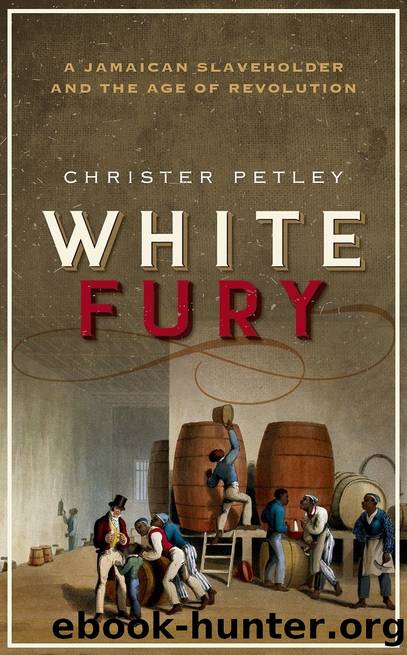White Fury: A Jamaican Slaveholder and the Age of Revolution by Christer Petley

Author:Christer Petley [Petley, Christer]
Language: eng
Format: epub
ISBN: 9780198791638
Google: i1RuDwAAQBAJ
Publisher: Oxford University Press
Published: 2018-11-15T00:28:53.646551+00:00
III Impasse
In the spring of 1789, Wilberforce rose for the first time in the House of Commons to propose an immediate abolition of the slave trade. He reflected on âthe magnitude of the subject . . . in which the interests, not of this country, nor of Europe alone, but of the whole world, and of posterity, are involvedâ. Taylor, along with the other members of the Jamaican assembly, soon produced a dissonant reaction from across the Atlantic. In November, they met to decide how to produce a coherent and united response from the white colonists of the island to âthe magnitude of a question which involves in it our property, our characters, and every interest that is dear and valuable to ourselves and our posterityâ.35
The assembly agreed to a series of resolutions, initially drafted by Bryan Edwards, one of its most outspoken and prominent members. These resolutions were subsequently published for circulation in Britain and expressed concern that Wilberforce had received encouragement from âpersons in high trust and authority under the crownâ, while maintaining that a unilateral British abolition would not serve British interests. They claimed that it would instead weaken the country, damage its economy, and throw the slave trade into the hands of other European powers. They attempted to rebut Wilberforceâs argument that the trade could be abolished without threatening the investments of Caribbean planters or their British creditors, denied claims about the mistreatment of enslaved workers on the estates, and argued that abolition unaccompanied by substantial compensation to colonial slaveholders would be unlawful.36
Along with their resolutions the men of the Jamaican legislature sent a remonstration to the House of Commons, stating that they had learned about the parliamentary proceedings on the question of the slave trade with âsurprise, equalled only by our afflictionâ. âAn abolition of the slave-trade of Great-Britain cannot but prove fatal to her colonial interestsâ, they argued, and noted that âthis blow is meditated when, after having struggled for several successive years with most calamitous visitations of Providence, a dawn of hope just opens upon usâ. They had been savouring the long-anticipated prospect of a period free from war, drought, or storms, when they as Jamaican planters could go about âgathering the fruits of our toilâ. They concluded that the ârights of the British colonists are as inviolable as those of their fellow-citizens within any part of the British dominionsâ, protected by an imperial constitution that did ânot give omnipotence to a British parliamentâ. The violation of colonial property by the ending of the slave trade âwithout our consent, or without full compensationâ, would, the assembly proclaimed, âbe an unconstitutional assumption of power, subversive of all public faith and confidence, as applied to the colonists; and must ultimately tend to alienate their affections from the parent stateâ.37
This bold assertion of colonial rights was a formal manifestation of a deep-seated disaffection that had been festering in Jamaica for nearly a decadeâthe consequence, as Taylor put it, of tensions between metropole and colony that had started as a mere âpimpleâ before being aggravated into an âuncurable ulcerâ.
Download
This site does not store any files on its server. We only index and link to content provided by other sites. Please contact the content providers to delete copyright contents if any and email us, we'll remove relevant links or contents immediately.
| Africa | Americas |
| Arctic & Antarctica | Asia |
| Australia & Oceania | Europe |
| Middle East | Russia |
| United States | World |
| Ancient Civilizations | Military |
| Historical Study & Educational Resources |
Machine Learning at Scale with H2O by Gregory Keys | David Whiting(4283)
Never by Ken Follett(3922)
Fairy Tale by Stephen King(3358)
Oathbringer (The Stormlight Archive, Book 3) by Brandon Sanderson(3110)
The Man Who Died Twice by Richard Osman(3055)
Will by Will Smith(2891)
Rationality by Steven Pinker(2344)
Can't Hurt Me: Master Your Mind and Defy the Odds - Clean Edition by David Goggins(2312)
The Dark Hours by Michael Connelly(2290)
Friends, Lovers, and the Big Terrible Thing by Matthew Perry(2208)
The Dawn of Everything: A New History of Humanity by David Graeber & David Wengrow(2183)
Principles for Dealing With the Changing World Order: Why Nations Succeed and Fail by Ray Dalio(2028)
HBR's 10 Must Reads 2022 by Harvard Business Review(1828)
A Short History of War by Jeremy Black(1827)
Go Tell the Bees That I Am Gone by Diana Gabaldon(1743)
A Game of Thrones (The Illustrated Edition) by George R. R. Martin(1698)
515945210 by Unknown(1654)
Kingdom of Ash by Maas Sarah J(1653)
443319537 by Unknown(1536)
